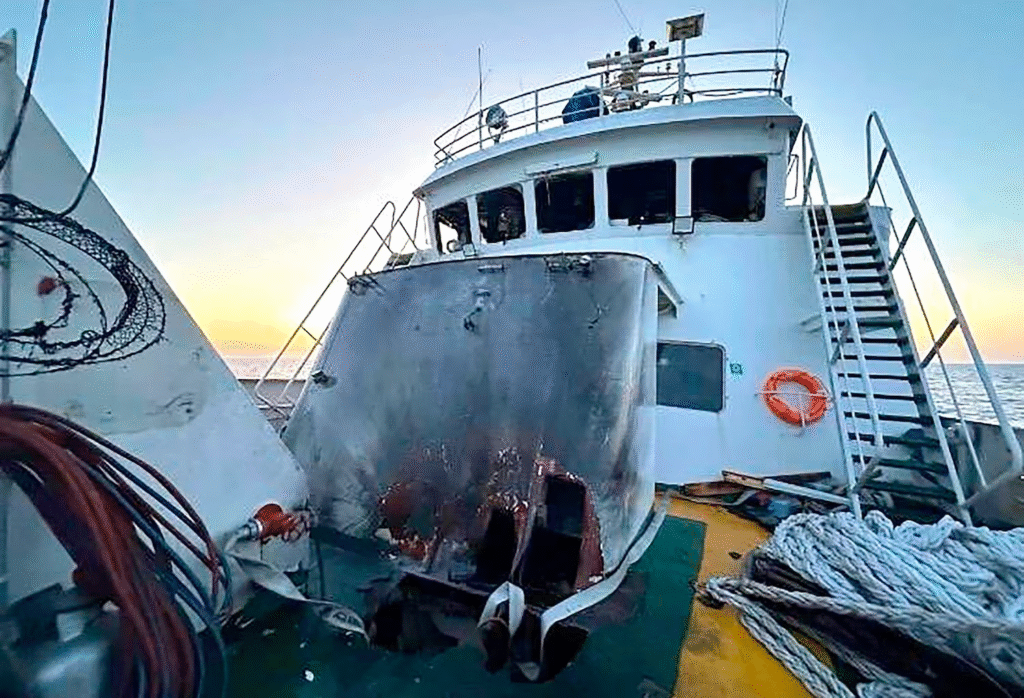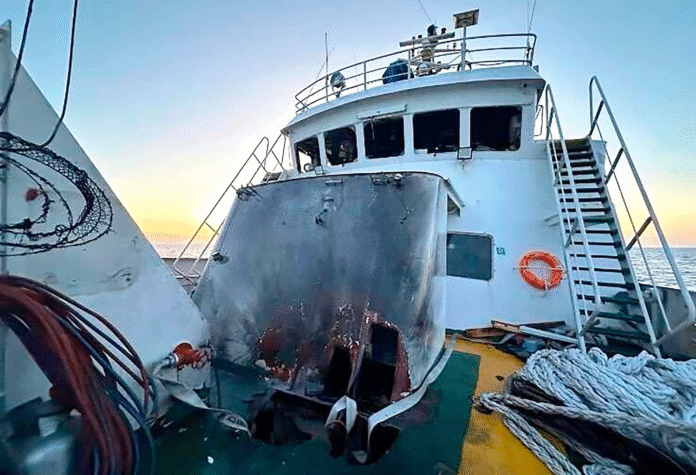
A humanitarian vessel bound for Gaza was struck by a drone on the night of May 2, 2025, as it sailed through international waters off the coast of Malta. The incident has raised alarm among activists who are campaigning to end Israel’s blockade on Gaza, and it has prompted calls for an immediate investigation into the attack.
The ship, Conscience, operated by the Freedom Flotilla Coalition (FFC), had been en route to Gaza, carrying humanitarian aid intended to alleviate the worsening conditions caused by Israel’s ongoing blockade. This blockade, imposed after a temporary ceasefire expired in March 2025, has severely restricted the entry of essential supplies into Gaza, exacerbating a humanitarian crisis that has already seen widespread malnutrition and suffering, particularly among children.
At approximately midnight, the Conscience issued a mayday call, reporting a fire on its bow. The Maltese government confirmed the distress call and quickly dispatched a tugboat to assist in firefighting operations. The ship, located in international waters at the time, was carrying 12 crew members and four civilian passengers. Fortunately, no injuries were reported.
However, the incident has sparked intense concern, as the FFC alleges the vessel was struck by drone-launched explosives. According to Yasemin Acar, a spokesperson for the FFC, most of the passengers and crew were asleep when they were abruptly awakened by the sound of explosions. Acar described the attack as involving two separate blasts, confirming that the crew was aware they were under attack after the vessel was struck twice.
While the immediate origin of the drone strike remains unclear, the FFC’s claims suggest the attack may have been deliberately targeted. The group has called for a full investigation into the incident and demanded that Israeli authorities be held accountable for the attack, which they argue violated international law. The group’s statement emphasized the ongoing blockade of Gaza, accusing Israel of using force to prevent humanitarian aid from reaching those in desperate need.
The Conscience was originally scheduled to dock in Malta on May 2 before continuing its journey to Gaza. The ship had set sail from Bizerte, Tunisia, on May 1, carrying supplies that Israel has been blocking from entering Gaza. In addition to the aid, the vessel planned to take on more passengers, including prominent climate activist Greta Thunberg and retired U.S. Army Colonel Mary Ann Wright. The ship’s mission was to protest the ongoing blockade and highlight the humanitarian consequences of Israel’s policies toward Gaza.
The Conscience‘s track data from MarineTraffic corroborates the timeline of the attack, showing the vessel veering off course shortly after midnight, shortly before it made the distress call. Photos and video footage provided by the FFC show visible damage to the bow of the vessel, as well as smoke and fire on board. This damage has been reviewed by Trevor Ball, a former U.S. Army explosive ordinance disposal specialist, who confirmed that the injuries to the ship are consistent with the effects of small blast munitions, typically deployed by drones.
Adding to the intrigue of the situation, flight tracking data from ADSBExchange shows that a military transport plane operated by Israel’s military flew over Malta earlier that afternoon. The plane, a Lockheed KC-130H, entered Maltese airspace at around 3:25 p.m. local time and conducted a zig-zag pattern near the eastern coast of Malta before returning to Israel. While it is unclear whether there is a direct connection between the plane’s movements and the reported attack on the Conscience, the proximity and timing have raised questions.
The Israeli government has not yet responded to requests for comment regarding the incident. The Israeli Defense Forces and the Ministry of Foreign Affairs have been contacted for clarification, as has the U.S. State Department, given the international nature of the attack.
This incident occurs against the backdrop of a larger and intensifying crisis in Gaza, where the ongoing blockade and conflict have led to widespread suffering. Aid organizations have expressed alarm over the dire conditions faced by the people of Gaza, especially as food and medical supplies have become increasingly scarce. The blockade, which began after the end of a ceasefire agreement in March, has been imposed by Israel as part of a strategy to pressure Hamas to release Israeli hostages still held in Gaza. However, many critics argue that the blockade punishes civilians and exacerbates an already catastrophic situation.
In the wake of the reported attack, the FFC has issued a call for international solidarity and a concerted effort to end the blockade and ensure that humanitarian aid reaches those in need. The group insists that the international community cannot stand by while such actions violate the rights of civilians and undermine efforts to provide life-saving assistance.
As activists and humanitarian organizations continue to call for action, the attack on the Conscience has underscored the growing risks faced by those who attempt to bring aid to Gaza. The vessel’s crew and passengers have shown remarkable resilience, and their determination to continue their mission is a testament to the power of activism in the face of adversity. The incident has also highlighted the international dimensions of the Gaza conflict and the critical importance of ensuring that humanitarian efforts are not thwarted by military aggression or political maneuvering.
The demand for an investigation into the drone strike remains urgent, as the international community grapples with how to address the complex humanitarian and political challenges posed by the ongoing blockade of Gaza. The fate of the Conscience and its crew will likely become a focal point in the broader struggle for human rights and justice in the region.


